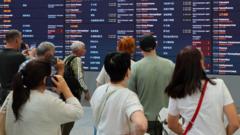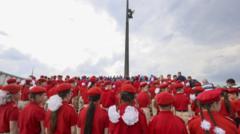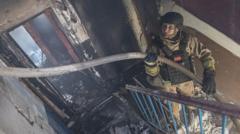Ukrainian President Volodymyr Zelensky has called for renewed peace negotiations with Russia as part of ongoing diplomatic moves to end the prolonged conflict, coinciding with U.S. support for Ukraine.
Renewed Hope for Peace: Zelensky Proposes Reviving Ukraine Talks

Renewed Hope for Peace: Zelensky Proposes Reviving Ukraine Talks
U.S.-Facilitated Diplomatic Efforts Aim to End Hostilities in Ukraine-Russia Conflict
President Volodymyr Zelensky of Ukraine has made a significant proposal to revive peace talks with Russia, which had appeared stalled until recently. This came in response to the Trump administration agreeing to facilitate the transfer of air defense weapons to Ukraine while threatening sanctions on Russia’s trade partners. Last month’s negotiations yielded little progress beyond exchanging bodies, prompting Zelensky's renewed call for dialogue.
In his recent address, Zelensky emphasized the need for discussions on key issues like cease-fires, prisoner exchanges, and the repatriation of Ukrainian children taken to Russia during the war. He reiterated his earlier offer for a direct meeting with Russian President Vladimir Putin, expressing frustration with Moscow's reluctance to engage meaningfully. "The Russian side must stop hiding from decisions," he stated, suggesting a meeting in Istanbul in the following week.
The Kremlin's response has been tepid, with spokesman Dmitri Peskov reiterating Putin's interest in a peaceful resolution but underscoring Russia's objectives in the conflict. Russia seeks to expand its territory, ensure Ukraine's neutrality regarding NATO, limit the size of Ukraine’s military, and recognize the Russian language in Ukraine—demands that complicate the peace process.
The Trump administration has been adamant about achieving an unconditional ceasefire as a precursor to substantive negotiations, a condition Ukraine has recently accepted. However, skepticism remains among Ukrainian and Western observers regarding the viability of an imminent resolution. Despite the push for negotiations, Russia has escalated its military offensives, emphasizing a paradoxical stance of seeking dialogue while intensifying attacks.
Legislators in Kyiv and foreign policy analysts are cautious, with little expectation of a rapid resolution to the conflict, as ongoing U.S. military aid, including additional air defense systems, is anticipated to embolden Ukraine. Recent agreements include U.S. provision of Patriot missile systems, with several NATO allies expected to supply arms as well. Strengthening Ukraine's defenses may alleviate pressures that might otherwise incentivize Russia to prolong delays in negotiations while seeking to exploit weaknesses in Ukraine's air defenses.
Andrew E. Kramer has been covering the Ukraine conflict since 2014 and provides insights into the complex dynamics at play, highlighting the urgent need for a negotiated settlement amidst ongoing hostilities.





















